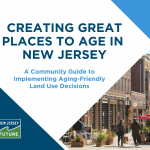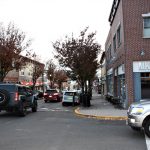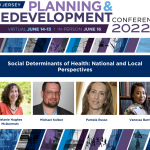New Jersey Future Blog
Helping towns design for all ages: New Jersey Future’s aging-friendly program is gaining momentum
February 15th, 2021 by Tanya Rohrbach
Despite the challenges of 2020, several towns followed through on their commitments toward creating great places to age. They recognize that addressing the health needs of older residents includes making sure the built environment supports the ability of older residents to choose safe, suitable housing options and to easily get around town, whether for accessing daily needs and services or for getting exercise or averting isolation. The impacts of COVID-19 on the older population has made the need for intentional aging-friendly community design more apparent than ever. An aging-friendly community design model is based on the livability of a community and includes access to: housing, transportation, mobility, public and open spaces, social interaction, health and wellness services, and other community elements.
Here’s a summary of milestones recently achieved by a number of towns New Jersey Future is working with to implement aging-friendly land use goals.
- The Borough of Pompton Lakes, Passaic County, engaged in a planning process to complete an aging-friendly land use assessment for the borough. The land-use assessment identified key steps the borough can take to facilitate a more aging-friendly environment such as permitting other housing types in single-family detached zones, improving pedestrian and bicycle access to destinations, and zoning changes to promote more compact mixed-use development in the downtown area. Pompton Lakes is actively seeking redevelopment opportunities, and the aging-friendly land use assessment will assist the Borough in using an aging-friendly lens to ensure the community grows in a way that benefits all residents.
- The Village of Ridgefield Park, Bergen County, also worked through a planning process with New Jersey Future to develop an aging-friendly land use assessment for the village. The land use assessment identified aging-friendly components the village can incorporate into its master plan update, including the creation of public spaces for social interaction and activation in the downtown, an increase in smaller, centrally-located housing units suitable for older residents, specific improvements to the pedestrian environment, and access to the waterfront.
- The Borough of Fair Lawn, Bergen County, worked with New Jersey Future to create an action plan to implement aging-friendly land use strategies. Fair Lawn is also engaged in redevelopment efforts and aims to ensure community changes are in line with aging-friendly principles. The action plan provides specific things the borough can do to integrate aging-friendly decision-making into municipal land use planning, policies, and regulations.
- The Village of Ridgewood, Bergen County, participated in a thorough implementation planning process to develop a detailed implementation plan that outlines specific actions to implement priority aging-friendly objectives. The goals the village identified in the planning process include, improving pedestrian safety and mobility, expanding housing diversity and affordability, creating a more vibrant and mixed-use downtown, and aligning the master plan with aging-friendly community design goals. Ridgewood, along with all the towns New Jersey Future worked with, also aims to engage residents in meaningful and effective aging-friendly community building initiatives.
In November 2020, New Jersey Future published Creating Great Places to Age: A Community Guide to Implementing Aging Friendly Land Use Decisions to provide step-by-step guidance for any town or advocate endeavoring to create a more aging-friendly community. The guide contains detailed descriptions of New Jersey Future’s process: from education and community building to conducting a land-use assessment to implementation. It contains a plethora of links and resources for any community to work through the process or learn more about aging-friendly communities or land use planning.
To demonstrate ways towns are actively trying to meet the housing needs of older residents throughout the state, New Jersey Future produced a report highlighting case studies of municipal strategies to diversify housing stock for an aging population. Case studies in the report describe how five municipalities throughout New Jersey have each implemented a strategy, providing a roadmap for other local governments or advocates. Case study strategies include a public-private partnership or changes to zoning to allow for accessory dwelling units, promoting transit-oriented development, or adopting a form-based code. Although the list is not inclusive of all strategies implemented by all New Jersey municipalities, it demonstrates that towns are capable of implementing a variety of strategies in a variety of ways that are suitable to their needs.
Moving forward, New Jersey Future will put a particular focus on dismantling barriers so that community members historically left out of the planning, decision-making, and benefits concerning their built environments can engage in this expanding initiative. Good community design can only be achieved when disparities are addressed head-on. This is a guiding principle for New Jersey Future as we continue to engage communities in becoming better places for people to live as they age.
Related Posts
Tags: aging-friendly, aging-friendly guide, Fair Lawn, milestones, new jersey future, Places to age, Pompton Lakes, Ridgefield Park, Ridgewood, towns
















